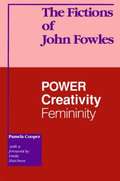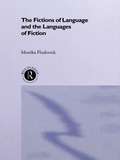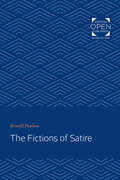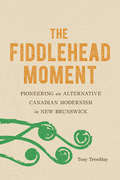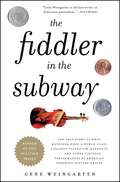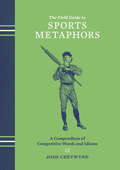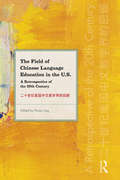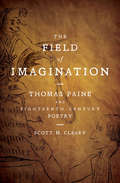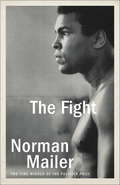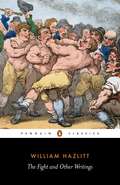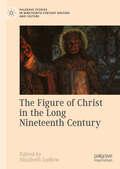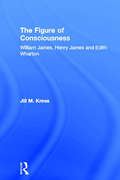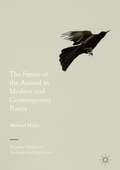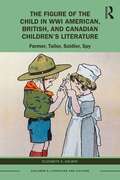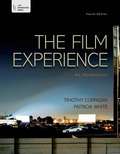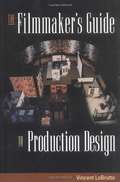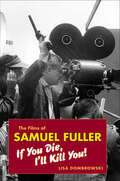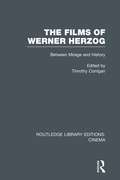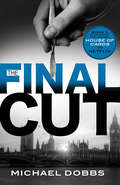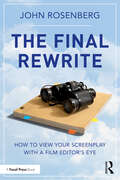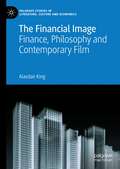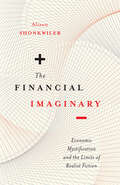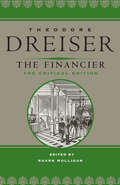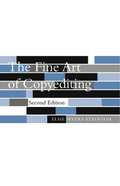- Table View
- List View
The Fictions of John Fowles: Power, Creativity, Femininity
by Pamela CooperThis incisive and skillfully articulated study explores the complex power relationships in John Fowles's fictions, particularly his handling of the pivotal subjects of art and sex.
The Fictions of Language and the Languages of Fiction
by Monika FludernikMonika Fludernik presents a detailed analysis of free indirect discourse as it relates to narrative theory, and the crucial problematic of how speech and thought are represented in fiction.Building on the insights of Ann Banfield's Unspeakable Sentences, Fludernik radically extends Banfield's model to accommodate evidence from conversational narrative, non-fictional prose and literary works from Chaucer to the present.Fludernik's model subsumes earlier insights into the forms and functions of quotation and aligns them with discourse strategies observable in the oral language. Drawing on a vast range of literature, she provides an invaluable resource for researchers in the field and introduces English readers to extensive work on the subject in German as well as comparing the free indirect discourse features of German, French and English.This study effectively repositions the whole area between literature and linguistics, opening up a new set of questions in narrative theory.
The Fictions of Satire
by Ronald PaulsonOriginally published in 1967. In this study of the English Augustan satirists, and the Roman and subsequent authors who were their models, Professor Paulson shows how rhetoric relates to imitation, persuasion to presentation, and the imitation of the satirist to the imitation of the satiric object. He illustrates the tendency of the satirist to invade his own fiction and imitate not the prime object of his satire but the satiric persona, which consequently takes on a life of its own. By analyzing the satiric fictions of the precursors of the Augustans, the author reveals the elements they bequeathed to those who rode the high crest of the satiric wave in England, before the art of satire became submerged in the deepening trough of sentimental romanticism.Paulson shows the Tories Dryden, Pope, and Swift and the Whigs Addison and Steele to be the heirs of a long line of satirists ancient and modern, from Horace, Juvenal, Lucian, Apuleius, and Petronius to Rabelais, Cervantes and the English Elizabethan and Civil War poets. Taking Swift as his main example, Paulson examines the dualism of satire in its most interesting and ambiguous modes, and as the embodiment of rhetorical devices that are as complex mimetically as they are rhetorically.
The Fiddlehead Moment: Pioneering an Alternative Canadian Modernism in New Brunswick
by Tony TremblayFor many Canadians, the small province of New Brunswick on Canada's scenic east coast is "a nice place to visit but no place to live," plagued for generations by outmigration and economic stagnation. In The Fiddlehead Moment Tony Tremblay challenges this potent stereotype by showcasing the work of a group of literary modernists who set out to change the meaning of New Brunswick in the national lexicon. Alfred Bailey, Desmond Pacey, Fred Cogswell, and a formidable group of local poets and cultural workers – collectively, New Brunswick's Fiddlehead School – sought to restore New Brunswick's literary reputation by adapting avant-garde modernist practices to the contours of the province, opening it to the contemporary world while also encouraging writers to make it their subject. The result was a non-urban form of modernism that was as responsive to technical innovation as to the human geographies of New Brunswick. By placing New Brunswick writers and critics at the forefront of Canadian literature in the midcentury modernist project, Tremblay adds an important new chapter to our understanding of Canadian modernism. The Fiddlehead Moment is the first critical examination of this group's considerable influence. Whether through Bailey's ethnomethodology, Pacey's critical ordering, or Cogswell's editorial eclecticism in the Fiddlehead magazine and Fiddlehead Poetry Books, authors in New Brunswick, Tremblay argues, had a profound impact on writing in Canada.
The Fiddlehead Moment: Pioneering an Alternative Canadian Modernism in New Brunswick
by Tony TremblayFor many Canadians, the small province of New Brunswick on Canada's scenic east coast is "a nice place to visit but no place to live," plagued for generations by outmigration and economic stagnation. In The Fiddlehead Moment Tony Tremblay challenges this potent stereotype by showcasing the work of a group of literary modernists who set out to change the meaning of New Brunswick in the national lexicon. Alfred Bailey, Desmond Pacey, Fred Cogswell, and a formidable group of local poets and cultural workers - collectively, New Brunswick's Fiddlehead School - sought to restore New Brunswick's literary reputation by adapting avant-garde modernist practices to the contours of the province, opening it to the contemporary world while also encouraging writers to make it their subject. The result was a non-urban form of modernism that was as responsive to technical innovation as to the human geographies of New Brunswick. By placing New Brunswick writers and critics at the forefront of Canadian literature in the midcentury modernist project, Tremblay adds an important new chapter to our understanding of Canadian modernism. The Fiddlehead Moment is the first critical examination of this group's considerable influence. Whether through Bailey's ethnomethodology, Pacey's critical ordering, or Cogswell's editorial eclecticism in the Fiddlehead magazine and Fiddlehead Poetry Books, authors in New Brunswick, Tremblay argues, had a profound impact on writing in Canada.
The Fiddler in the Subway
by Gene WeingartenGENE WEINGARTEN IS THE O. HENRY OF AMERICAN JOURNALISM Simply the best storyteller around, Weingarten describes the world as you think it is before revealing how it actually is--in narratives that are by turns hilarious, heartwarming, and provocative, but always memorable. Millions of people know the title piece about violinist Joshua Bell, which originally began as a stunt: What would happen if you put a world-class musician outside a Washington, D.C., subway station to play for spare change? Would anyone even notice? The answer was no. Weingarten's story went viral, becoming a widely referenced lesson about life lived too quickly. Other classic stories--the one about "The Great Zucchini," a wildly popular but personally flawed children's entertainer; the search for the official "Armpit of America"; a profile of the typical American nonvoter--all of them reveal as much about their readers as they do their subjects.
The Field Guide to Sports Metaphors: A Compendium of Competitive Words and Idioms
by Josh ChetwyndA gift-worthy playbook of common and unexpected words and idioms that have their roots in sports and games. There are many metaphors we can quickly identify from the realm of sports: covering all the bases (baseball), game plan (football), and par for the course (golf). But the English language is also peppered with the not-so-obvious influence of sports and games, such as go-to guy (basketball) and dead ringer (horse racing). Filled with pithy entries on each idiom, plus quotes showing how big talkers from President Obama to rapper Ice-T use them, this quirky little handbook from former minor league ballplayer and award-winning journalist Josh Chetwynd is sure to be a conversation starter at tailgates, cocktail parties, and in the boardroom.From the Hardcover edition.
The Field of Chinese Language Education in the U.S.: A Retrospective of the 20th Century
by Vivian LingThis book will be the first account of the development of Chinese as a foreign language in the U.S., as it interacts with the relevant entities in China and beyond. There are virtually no systematic retrospective reflections on the field outside of the greater China region; and yet over the past decades the field has grown by leaps and bounds, and it is critical now that we pause to reflect on what has happened and what we can learn from the past. The contributors are among some of the most influential pioneers in the field whose entire academic lives have been dedicated to its development. The Field of Chinese Language Education in the U.S.: A Retrospective of the 20th Century is aimed at those who are currently engaged in Chinese language education, as teachers or as students.
The Field of Imagination: Thomas Paine and Eighteenth-Century Poetry
by Scott M. ClearyOne of America’s Founding Fathers, Thomas Paine is best remembered as the pamphleteer who inspired the American Revolution. Yet few also know him as an eighteenth-century poet of considerable repute. In The Field of Imagination, Scott Cleary offers the first book on Paine’s poetry, exploring how poetry written both by and about Paine is central to understanding his development as a political theorist.Despite his claim in The Age of Reason that he was abandoning poetry because it led too much into the "field of imagination," Paine never completely left poetry behind. He took advantage of his position as editor of the Pennsylvania Magazine to situate his poetry in relation to the magazine’s tacit support of American independence. He drew on two British poets, James Thomson and Charles Churchill, to provide revealing epigraphs for his major early works in support of that independence, and in turn he himself became an influence on early American poets such as Joel Barlow and Philip Freneau.Paine’s poetry has until now been largely relegated to the status of scholarly curiosity. But whether through his own poetry, his thoughts on the place and function of poetry in the Age of Reason, or his deep influence on the poetry of the early American republic, Paine’s involvement in poetical craft provides a lens onto the unique and tempestuous literary culture of the eighteenth century.
The Fight
by Norman MailerIn 1974 in Kinshasa, Zaïre, two African American boxers were paid five million dollars apiece to fight each other. One was Muhammad Ali, the aging but irrepressible "professor of boxing." The other was George Foreman, who was as taciturn as Ali was voluble. Observing them was Norman Mailer, a commentator of unparalleled energy, acumen, and audacity. Whether he is analyzing the fighters' moves, interpreting their characters, or weighing their competing claims on the African and American souls, Mailer's grasp of the titanic battle's feints and stratagems--and his sensitivity to their deeper symbolism--makes this book a masterpiece of the literature of sport.
The Fight and Other Writings
by William HazlittHazlitt is one of the greatest masters of English prose style and this new selection demonstrates the variety and richness of his writing. The volume includes classic pieces of drama and literature criticism, such as his essays on Shakespeare and Coleridge, as well as less well-known material from his social and political journalism. This collection encourages the reader to reconsider the nature of critical writing, which Hazlitt transforms into an art form.
The Figure of Christ in the Long Nineteenth Century (Palgrave Studies in Nineteenth-Century Writing and Culture)
by Elizabeth LudlowThis book is an interdisciplinary collection of essays that explores the variety ofways in which the interface between understanding the figure of Christ, theplace of the cross, and the contours of lived experience, was articulated throughthe long nineteenth century. Collectively, the chapters respond to thetheological turn in postmodern thought by asking vital questions about the wayin which representations of Christ shape understandings of personhood and ofthe divine.
The Figure of Consciousness: William James, Henry James and Edith Wharton (Literary Criticism and Cultural Theory)
by Jill M. KressFirst Published in 2002. Routledge is an imprint of Taylor & Francis, an informa company.
The Figure of the Animal in Modern and Contemporary Poetry (Palgrave Studies in Animals and Literature)
by Michael MalayThis book argues that there are deep connections between ‘poetic’ thinking and the sensitive recognition of creaturely others. It explores this proposition in relation to four poets: Marianne Moore, Elizabeth Bishop, Ted Hughes, and Les Murray. Through a series of close readings, and by paying close attention to issues of sound, rhythm, simile, metaphor, and image, it explores how poetry cultivates a special openness towards animal others. The thinking behind this book is inspired by J. M. Coetzee’s The Lives of Animals. In particular, it takes up that book’s suggestion that poetry invites us to relate to animals in an open-ended and sympathetic manner. Poets, according to Elizabeth Costello, the book’s protagonist, ‘return the living, electric being to language’, and, doing so, compel us to open our hearts towards animals and the claims they make upon us. There are special affinities, for her, between the music of poetry and the recognition of others. But what might it mean to say that poets to return life to language? And why might this have any bearing on our relationship with animals? Beyond offering many suggestive starting points, Elizabeth Costello says very little about the nature of poetry’s special relationship with the animal; one aim of this study, then, is to ask of what this relationship consists, not least by examining the various ways poets have bodied forth animals in language.
The Figure of the Child in WWI American, British, and Canadian Children’s Literature: Farmer, Tailor, Soldier, Spy (Children's Literature and Culture)
by Elizabeth A. GalwayOver the past century, much attention has been paid to the literature written for adults in response to the First World War, but there has been comparatively little consideration of how the war influenced literature for young readers at the time. Based on extensive archival research, this study examines an array of wartime writing for young people and provides a new understanding of the complexities and nuances within children’s literature of the period. In its discussion of nearly 150 primary sources from Britain, Canada, and the United States, this volume considers some well-known texts but also brings to light forgotten children’s literature of the era, providing new insights into how WWI was presented to the young people whose lives were indelibly impacted by the crisis. Paying special attention to the varied ways in which child figures were depicted, it reflects on what these portrayals reveal about adult conceptualizations of youth, and it considers how these may have shaped young readers’ own views of armed conflict, citizenship, and childhood. From the helpless victim to the heroic combatant, child figures appeared in many guises, exposing a range of adult concerns about nation, empire, and children’s citizenship. Exploring everything from alphabet books for beginning readers, to recruitment materials for high school students, this book examines works from multiple genres and provides a uniquely comprehensive study of transatlantic children’s literature produced during the first global war.
The Film Experience: An Introduction
by Patricia White Timothy CorriganIn our culture, watching movies is a universal experience - but understanding film may not be. The Film Experience reaches out to students, connecting their experiences watching movies with better understanding and knowledge of the medium's full scope. And with its game-changing new video program in LaunchPad Solo (see below), this thoroughly updated new edition makes it easier than ever to link each student's personal viewing to a greater overall understanding of film.Timothy Corrigan and Patricia White's classroom favorite is both authoritative and joyful about watching, analyzing, and understanding film. With clips from classic and contemporary films (Rear Window, Life of Pi, Moonrise Kingdom, Chinatown, and many others) plus hundreds of movie images and other graphics, the thoroughly revised new edition covers everything from editing to cinematography to narrative genres, all in a cultural context that reinforces why films and film study matter. The book's features--Form in Action, Film in Focus, and Concepts at Work --combine text, stills, and links to videos online to explore specific films, scenes, and trends in depth.
The Filmmaker's Guide to Production Design
by Vincent LoBruttoLearn to turn a simple screenplay into a visual masterpiece! Top production designers share their real-life experiences to explain the aesthetic, narrative, and technical aspects of the craft. Step by step, aspiring filmmakers will discover sound instruction on the tools of the trade, and established filmmakers will enjoy a new outlook on production design. They will learn, for example, the craft behind movie magic-such as how to create a design metaphor, choose a color scheme, use space, and work within all genres of film, from well-funded studio projects to "guerilla filmmaking." This indispensable resource also contains a history of movie making and guidelines for digital production design. For the experienced filmmaker seeking new design ideas to the struggling newcomer stretching low-budget dollars, this book makes the processes and concepts of production design accessible.Allworth Press, an imprint of Skyhorse Publishing, publishes a broad range of books on the visual and performing arts, with emphasis on the business of art. Our titles cover subjects such as graphic design, theater, branding, fine art, photography, interior design, writing, acting, film, how to start careers, business and legal forms, business practices, and more. While we don't aspire to publish a New York Times bestseller or a national bestseller, we are deeply committed to quality books that help creative professionals succeed and thrive. We often publish in areas overlooked by other publishers and welcome the author whose expertise can help our audience of readers.
The Films of Samuel Fuller: If You Die, I'll Kill You (Wesleyan Film)
by Lisa DombrowskiFirst comprehensive study of this American original A cigar-chomping storyteller who signaled "Action!" by shooting a gun, Samuel Fuller has been lionized as one of the most distinctive writer/directors ever to emerge from Hollywood. In such films as The Steel Helmet, Pickup on South Street, Shock Corridor, and The Big Red One, Fuller gleefully challenged classical and generic norms—and often standards of good taste—in an effort to shock and arouse audiences. Tackling war, crime, race, and sexuality with a candor rare for any period, Fuller's maverick vision was tested by Hollywood's transition from the studio system to independent filmmaking. Now, in the first full account of all of the director's audaciously original work, author Lisa Dombrowski brings his career into new relief. The Films of Samuel Fuller features close analysis of Fuller's pictures and draws on previously untapped production and regulatory files, script notes, and interviews to explore how artistic, economic, and industrial factors impacted Fuller's career choices and shaped the expression of his personal aesthetic. Fans of Fuller and American cinema will welcome this in-depth study of a provocative director who embodied both the unique opportunities and challenges of postwar filmmaking.
The Films of Werner Herzog: Between Mirage and History (Routledge Library Editions: Cinema)
by Timothy CorriganGiven Herzog’s own pronouncement that ‘film is not the art of scholars, but of illiterates,’ it is not surprising that his work has aroused ambivalent and contradictory responses. Visually and philosophically ambitious and at the same time provocatively eccentric, Herzog’s films have been greeted equally by extreme adulation and extreme condemnation. Even as Herzog’s rebellious images have gained him a reputation as a master of the German New Wave, he has been attacked for indulging in a romantic naiveté and wilful self-absorption. To his hardest critics, Herzog’s films appear as little more than Hollywood fantasies disguised as high seriousness. This book is an attempt to illuminate these contradictions. It gathers essays that focus from a variety of angles on Herzog and his work. The contributors move beyond the myths of Herzog to investigate the merits of his work and its place in film history. A challenging range of films is covered, from Fata Morgana and Aguirre, the Wrath of God to more recent features such as Nosferatu and Where the Green Ants Dream, offering the reader ways of understanding why, whatever the controversies surrounding Herzog and his films, he remains a major and popular international filmmaker. Orignally published in 1986.
The Final Cut (House of Cards #3)
by Michael DobbsThe final book in the Internationally Bestselling trilogy that inspired the hit Netflix series House of Cards.Months from taking his place as the longest-serving Prime Minister this century, Francis Urquhart's country is tiring of him. But he's not about to be driven from office. If the public demands new blood, that is precisely what he will give them...This is a different Francis Urquhart – more vulnerable, more loving, and more ruthless than ever. He will risk everything, but one thing is certain: whatever the outcome of this, his greatest gamble, the name of Francis Urquhart will never be forgotten.Finishing the dark tale of greed, corruption, and unquenchable ambition, The Final Cut reveals that no matter the country, politics, intrigue and passion reign in the corridors of power. An explosive political thriller, fans of Vince Flynn, David Baldacci and Robert Ludlum will enjoy this stunning conclusion to Dobb's trilogy.As a former advisor to Margaret Thatcher, Conservative Party Chief of Staff, and now peer of the realm and Conservative member of the House of Lords, Baron Michael Dobbs provides an insider look at the twists and turns of British politics.Other books in the House of Cards series:House of Cards, Book 1 – The dark, twisting schemes of a politician determined to succeedTo Play The King, Book 2 – Newly elected Prime Minister plots to take on the Monarchy to grab even more powerThe Final Cut, Book 3 – The perfect finale to this twisted trilogy, Urquhart refuses to close his career quietlyWhat readers are saying about House of Cards:"If you enjoy political intrigue, murder, and a truly loathsome character you will greatly enjoy this final installment by Dobbs.""Great book highly recommend if you are currently viewing House of Cards.""Francis Urquhart is on a par with RIchard III as a baddie of literature. And yet Dobbs has us cheering from him at every turn.""Dobbs ties off the House of Cards series with a bang and pens, perhaps, his best novel of the trilogy.""Francis Urquhart at his finest, the ultimate chess game against the world.""the sharpest, smartest, and most intelligent writing I have read.""A superb ending to the series!"What reviewers are saying about House of Cards:"A triumphant return...the best book of the three. The action is unflagging, the characterization razor-sharp, the satirical barbs at politics and politicians unfailingly accurate. What a brilliant creation F.U. is." —Sunday Telegraph"Razor-sharp and merciless...One thing is certain: F.U. will be remembered for much longer than many a real Prime Minister." - Daily Mail"Thoroughly entertaining. Urquhart is a joy, and the wonderful games he plays have lost none of their attraction." - The TimesWhat everyone is saying about the House of Cards books:"This blood and thunder tale, lifelike and thoroughly cynical, certainly carries the ring of authenticity....a great triumph." — The Independent"…a political thriller writer with a marvellous inside track knowledge of government." - Daily Express"If you are a fan of the modern TV series than you should definitely pick up these books.""Michael Dobbs has an uncanny knack of forecasting the future. A fascinating read and a conclusion that would send a chill through Buckingham Palace." - Sunday Express
The Final Rewrite: How to View Your Screenplay with a Film Editor’s Eye
by John RosenbergThis book offers a unique perspective on crafting your screenplay from an editor’s point-of-view. Special features include before and after examples from preproduction scripts to post production final cuts, giving screenwriters an opportunity to understand how their screenplay is visualized in post production. By the time a script reaches the editing room, it has passed through many hands and undergone many changes. The producer, production designer, director, cinematographer, and actor have all influenced the process before it gets to the editor’s hands. Few scripts can withstand the careful scrutiny of the editing room. This book reveals how to develop a script that will retain its original vision and intent under the harsh light of the editing console. It provides insights that writers (as well as producers and directors) need and editors can provide for a safe journey from the printed page to the final release. This book is ideal for aspiring and early career screenwriters, as well as filmmakers and established screenwriters who want to gain a better understanding of the editing process.
The Financial Image: Finance, Philosophy and Contemporary Film (Palgrave Studies in Literature, Culture and Economics)
by Alasdair KingThe Financial Image: Finance, Philosophy, and Contemporary Film draws on a broad range of narrative feature films, documentaries, and moving image installations in the US, Europe, and Asia. Using frameworks from contemporary philosophy and critical finance studies, the book explores how contemporary cinema has registered recent financial and economic issues. The book focuses on how filmmakers have found formal means to explore, celebrate, and critique the increasingly important role that the financial sector plays in shaping global economic, political, ethical, and social life.
The Financial Imaginary: Economic Mystification and the Limits of Realist Fiction
by Alison ShonkwilerAs the world has been reshaped since the 1970s by neoliberalism and globalization, increasing financial abstraction has presented a new political urgency for contemporary writers. Globalized finance, the return to Gilded Age levels of inequality, and the emergence of new technologies pose a similar challenge to the one faced by American social realists a century ago: making the virtualization of capitalism legible within the conventions of the realist novel. In The Financial Imaginary, Alison Shonkwiler reads texts by Richard Powers, Don DeLillo, Jane Smiley, Teddy Wayne, and Mohsin Hamid to examine how fiction confronts the formal and representational mystifications of the economic. As Shonkwiler shows, these contemporary writers navigate the social, moral, and class preoccupations of American &“economic fiction&” (as shaped by such writers as William Dean Howells, Henry James, Frank Norris, and Theodore Dreiser), even as they probe the novel&’s inadequacies to tell the story of an increasingly abstract world system. Drawing a connection from historical and theoretical accounts of financialization to the formal contours of contemporary fiction, The Financial Imaginary examines the persistent yet vexed relationship between financial representation and the demands of literary realism. It argues that the novel is essential to understanding our relation to the mystifications of abstraction past and present.
The Financier: The Critical Edition (The Dreiser Edition)
by Theodore DreiserFirst published in 1912, Theodore Dreiser's third novel, The Financier, captures the ruthlessness and sparkle of the Gilded Age alongside the charismatic amorality of the power brokers and bankers of the mid-nineteenth century. This volume is the first modern edition of The Financier to draw on the uncorrected page proofs of the original 1912 version, which established Dreiser as a master of the American business novel. The novel was the first volume of Dreiser’s Trilogy of Desire, also known as the Cowperwood Trilogy, which includes The Titan (1914) and The Stoic (1947). Dreiser laboriously researched the business practices and personal exploits of real-life robber baron Charles Yerkes to narrate Frank Algernon Cowperwood's early career in The Financier, which explores the unscrupulous world of finance from the Civil War through the panic incited by the 1871 Chicago fire. In 1927, the monumental novel reappeared in a radically revised version for which Dreiser, notorious for lengthy novels, agreed to cut more than two hundred and seventy pages. This revised version became the most familiar, reprinted by publishers and studied by scholars for decades. For this new edition, Roark Mulligan meticulously reviewed earlier versions of the novel and its publication history, including the last-minute removal of paragraphs, pages, and even whole chapters from the 1912 edition, cuts based mainly on the advice of H. L. Mencken. The restored text better matches Dreiser's original vision for the work. More than three hundred additional pages not available to modern readers--including those cut from the 1927 edition and more than seventy hastily removed from the manuscript just days before publication in 1912--more effectively establish characterization and motivation. Restored passages dedicated to the internal thoughts of major and minor characters bring a softer dimension to a novel primarily celebrated for its realistic attention to the cold external world of finance. Mulligan's historical commentary reveals new insights into Dreiser's creative practices and how his business knowledge shaped The Financier. This supplemental material considers the novel's place within the tradition of American business novels and its reflections on the scandalous business practices of the robber baron era.
The Fine Art of Copyediting (2nd Edition)
by Elsie Myers StaintonIncludes Advice To Editors On How To Get Along With Authors, And Tips On Style For Both.
